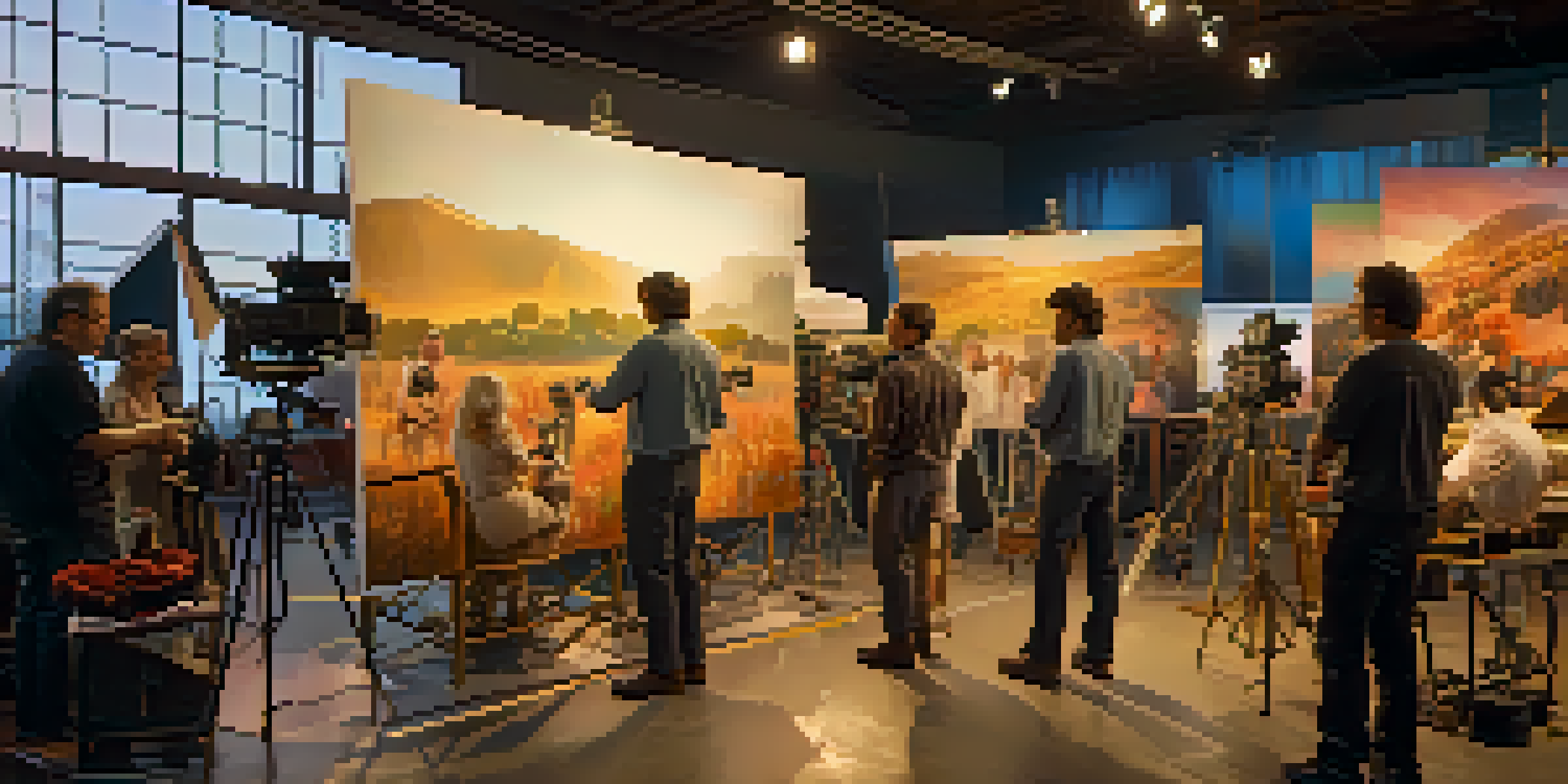Intellectual Property Rights: Ethics in Film Production

Understanding Intellectual Property Rights in Film
Intellectual Property Rights (IPR) are essential in protecting creative works, especially in the film industry. They encompass various legal rights that allow creators to control the use of their original content. This means that filmmakers can safeguard their scripts, music, and visual elements from unauthorized use. By understanding IPR, filmmakers can ensure their visions are respected and monetized appropriately.
Intellectual property rights are the cornerstone of creativity and innovation.
In the film production landscape, IPR includes copyrights, trademarks, and patents, each serving a specific purpose. Copyrights protect the actual film and its creative components, while trademarks safeguard the branding associated with a movie. Patents, on the other hand, are less common but can protect unique technologies used in filming. Understanding these distinctions helps filmmakers navigate the complex world of intellectual property.
Ultimately, recognizing the importance of IPR is crucial for filmmakers not just for legal protection but also for fostering innovation. When creators know their rights, they are more likely to take creative risks, leading to fresh and engaging content. This not only benefits individual filmmakers but also enriches the entire film industry.
The Ethical Implications of Copyright Infringement
Copyright infringement occurs when someone uses a creator's work without permission, raising significant ethical concerns in film production. When filmmakers plagiarize or fail to credit original creators, it undermines the trust and integrity of the industry. This can lead to a culture where creativity is stifled, as artists may be hesitant to share their work for fear of theft.

An example of this can be seen in high-profile cases where filmmakers faced backlash for copying elements from lesser-known works. Such incidents not only damage reputations but can also lead to costly lawsuits. This illustrates how ethical breaches can have far-reaching consequences, impacting not just the individuals involved but also the audience's perception of the film.
Understanding Intellectual Property Rights
Intellectual Property Rights empower filmmakers to protect their original works, fostering creativity and innovation in the industry.
To combat these issues, filmmakers need to prioritize ethical practices, such as conducting thorough research and obtaining necessary permissions. By doing so, they can foster a more respectful and collaborative environment within the industry. Ultimately, adhering to ethical standards in copyright use contributes to a healthier creative ecosystem.
The Role of Licensing in Film Production Ethics
Licensing is a critical component of ethical film production, allowing creators to use others' work legally. It involves obtaining permission from copyright holders, ensuring that everyone involved in the creative process is fairly compensated. This practice not only promotes respect for original creators but also enhances collaboration across various artistic fields.
Plagiarism is the most resounding form of theft.
For instance, when a filmmaker wants to use a popular song in their movie, they must secure a license from the music's copyright owner. This process can sometimes be complex, requiring negotiations and financial agreements. However, it is essential for maintaining ethical standards and protecting the rights of all creators involved.
By understanding and embracing licensing, filmmakers can enrich their work while honoring the contributions of others. This commitment to ethical practices not only safeguards their projects but also strengthens relationships within the industry. Ultimately, licensing fosters a culture of respect and collaboration, benefiting everyone in the creative community.
The Impact of Plagiarism on Film Integrity
Plagiarism in film is a serious ethical issue that can shake the very foundation of the industry. When filmmakers lift ideas or scenes from others without credit, they compromise not only their work but also the trust of their audience. This can lead to a loss of credibility and respect, making it difficult for the plagiarist to work in the industry again.
Consider the case of a film that closely mirrored another's plot without acknowledgment. The backlash from audiences and critics can be swift and unforgiving, highlighting how plagiarism can tarnish reputations. This underscores the importance of originality and integrity in filmmaking, as audiences value authenticity.
The Role of Licensing in Filmmaking
Licensing ensures that filmmakers legally use others' creative works, promoting ethical practices and fair compensation.
To maintain the integrity of their work, filmmakers should cultivate their unique voices and draw inspiration ethically. Engaging in honest storytelling not only enriches the cinematic experience but also honors the art of filmmaking itself. By avoiding plagiarism, creators contribute to a vibrant, innovative film landscape.
Embracing Fair Use in Creative Storytelling
Fair use is a legal doctrine that allows limited use of copyrighted material without permission under specific circumstances. In film production, this can include quoting a line from a script or using brief clips for commentary. Understanding fair use is crucial for filmmakers as it provides a framework for incorporating existing works into new narratives ethically.
For example, documentaries often rely on fair use to include clips from other films or media when discussing their impact. This not only adds depth to the storytelling but also respects the original works' context. However, filmmakers must tread carefully, as fair use can be subjective and is determined on a case-by-case basis.
By embracing fair use responsibly, filmmakers can enrich their storytelling while respecting the rights of original creators. This balance is essential for fostering a creative environment where inspiration flows freely. Ultimately, fair use promotes innovation, allowing filmmakers to build upon existing works in meaningful ways.
The Importance of Transparency in Film Production
Transparency in film production is vital for promoting ethical practices and maintaining trust among stakeholders. When filmmakers are open about their creative processes, including how they handle intellectual property, it fosters a culture of accountability. This transparency not only enhances relationships with collaborators but also with audiences who increasingly value ethical storytelling.
For instance, sharing information about licensing agreements and the use of copyrighted materials can build credibility. When filmmakers openly credit their sources, it demonstrates respect for the original creators and their contributions. This practice can enhance the film's reputation and encourage viewers to engage with the work more deeply.
Embracing Fair Use Responsibly
Fair use allows filmmakers to incorporate existing works into new narratives ethically, enhancing storytelling while respecting original creators.
Moreover, transparency can act as a safeguard against potential legal issues. By clearly documenting the use of intellectual property, filmmakers can protect themselves from accusations of infringement. Ultimately, embracing transparency contributes to a healthier film industry where ethical practices are prioritized.
Future Trends in Intellectual Property Ethics in Film
As technology evolves, the ethical landscape of intellectual property in film production is also changing. New platforms for distribution and the rise of streaming services have introduced fresh challenges and opportunities for filmmakers. Understanding these trends is essential for navigating the complexities of IPR in a rapidly transforming industry.
For example, the rise of user-generated content has blurred the lines between inspiration and infringement. Filmmakers must be vigilant about how their work is shared and remixed online, as this can lead to both creative opportunities and ethical dilemmas. This dynamic environment necessitates a proactive approach to IPR, where filmmakers stay informed and adapt to emerging challenges.

Looking ahead, embracing technological advancements while upholding ethical standards will be crucial for the film industry. By fostering a culture of respect for intellectual property, filmmakers can continue to innovate while honoring the contributions of their peers. This balance will be key to sustaining a vibrant and ethical creative ecosystem in the years to come.